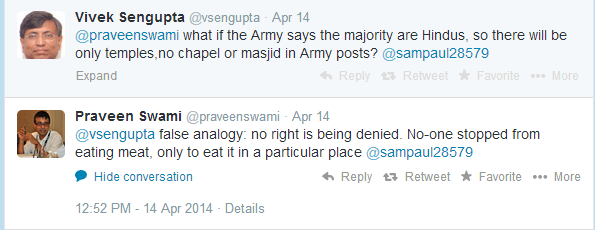A photo of the notice, issued on April 10, has been all over the media and social media for the past few days, sparking fierce debates on forums like Twitter, Facebook and Reddit about food policies in office canteens.
The Hindu has had a vegetarian-only policy in its office canteen for a long time, and the notice, prompted by complaints from some employees about the norm being flouted, was a reiteration of the fact that “non-veg food is strictly prohibited” inside the dining hall. This would mean that if staff members want to eat meat from their own lunch boxes, they would have to eat it outside the dining hall. The logic provided by the organisation was that non-vegetarian food “causes discomfort to the majority of the employees who are vegetarian”.
Given the newspaper’s reputation for being liberal in its outlook, many users of social media were taken aback by the notice. One article analysed the company’s move as a reflection of caste-bias, since many employees at the newspaper are Brahmins. But The Hindu is hardly the only company to insist on vegetarian norms.
In Mumbai, at the headquarters of multinational company Essar, employees are proud to claim that they have a 100% pure vegetarian food policy in the canteen. “It’s about a certain culture – people may or may not like non-veg food, so we don’t serve meat in the canteen and have requested people to only carry vegetarian food in their dabbas,” said Manish Kedia, head of corporate communications at Essar.
According to HR consultants, such policies are not very prevalent in north India, but many organisations, if founded or headed by the traditionally vegetarian Jain or Marwari communities, do not allow meat eating in the canteen. If they don't impose bands on non-vegetarian food in the workplace, many office canteens may instead have separate microwaves for employees to heat vegetarian and non-vegetarian food. In fact, the Good Food magazine run by the Times Group has been publishing only vegetarian recipes for a while.
“Policies in Indian companies typically reflect the values of their promoters or owners, who tend to be vegetarian in many cases,” said A Rabindranath, Delhi-based director of management consulting company Hay Group. While his own company does not have any restrictions on non-vegetarian food, Rabindranath believes it is the prerogative of each company to fix its own policies and rules. “All non-vegetarians also eat vegetarian food, so disallowing meat in dining areas does not mean they are being deprived of food,” he said.
In the fervent debates on Twitter this week, many people seemed to share this point of view, including The Hindu editors Malini Parthasarathy and Praveen Swami, who were defending the company’s decision from accusations of being casteist, pro-Hindutva and of denying meat-eaters their right to choice:




Women’s rights activist Kavita Krishnan offered sharp criticism of the anti-meat workplace policy, stating, in a series of tweets: “I am an ethical vegetarian but find it Brahmanical, offensive to ban non-veg food at any workplace...in backdrop of [Narendra] Modi’s speeches [regarding] meat, can’t ignore politics of imposing vegetarian food on people.”
Perhaps the last word in the debate came from a Facebook post by Krishnan’s mother, Lakshmi Krishnan, an animal rights advocate and ethical vegetarian: “Absolutely shocking that tiffins should be policed...deciding to be veg or non-veg should be a personal choice and so many of us vegetarians know that we have no right to be holier than thou”.










